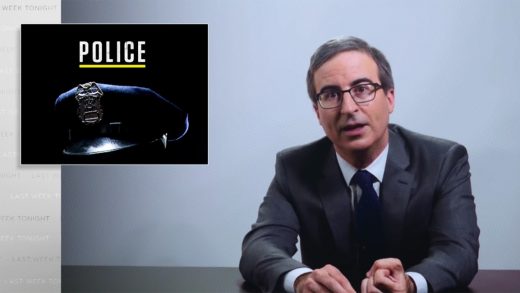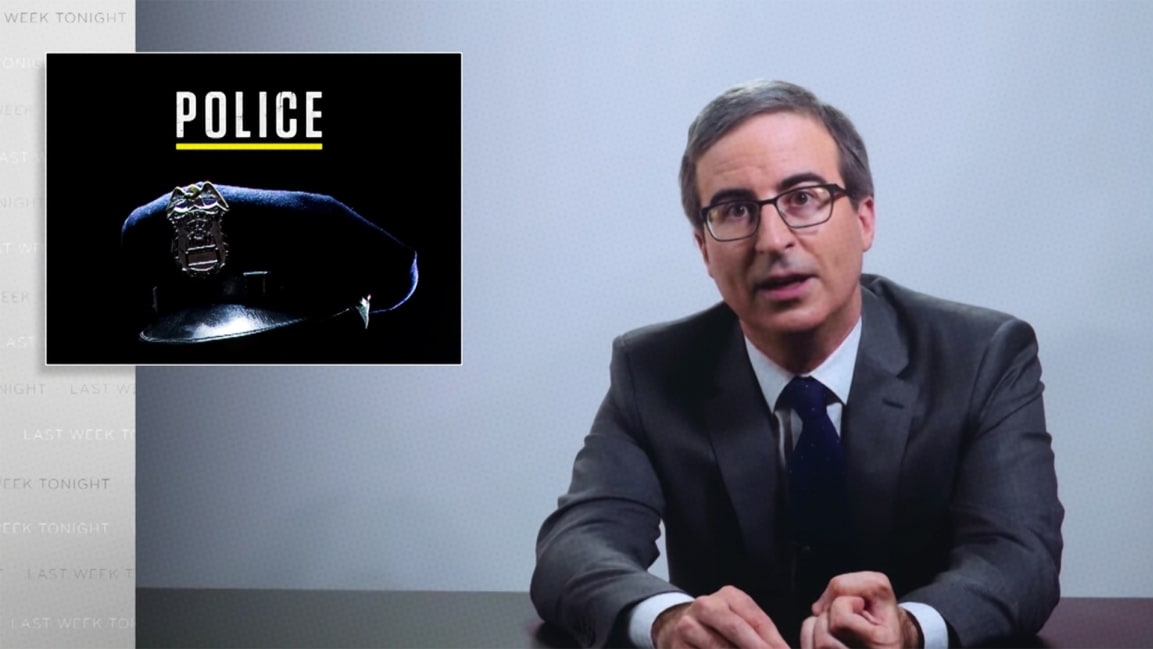5 takeaways from John Oliver’s outstanding ‘Last Week Tonight’ episode on defunding the police
The death of George Floyd at the hands of Minneapolis police two weeks ago has awakened more Americans than ever before to the existence of racist police brutality.
According to a survey from Yahoo News/YouGov, 61 percent of Americans recognize that race was a “major factor” in Floyd’s death. Not only do most Americans support the ongoing protests that have followed Floyd’s death; 59% are more troubled by the police violence that sparked them than they are by the occasional violence that has resulted from them. Americans largely seem to agree that the police as an institution is in desperate need of some kind of overhaul.
Of course, there’s a lot of disagreement about what that overhaul might look like, along with a collective misunderstanding of the deep-rooted problems that have led us here. Over the weekend, John Oliver stepped into the fray with a plus-size episode of Last Week Tonight entirely devoted to this topic.
While the whole episode is worth watching for anyone interested in the conversation about police reform, here are five key takeaways.
The scope of the problem
After establishing what this episode will not be focusing on (Donald Trump, looters), Oliver rattles off some statistics that should alarm all the people who have not already internalized them just from being out in the world. Minneapolis police have been found to use force against black people at a full seven times the rate that they have against white people. Black Americans are about two and a half times as likely to be killed by police as white people. And at the rate we’ve been going, one in a thousand black men can expect to be killed by police. These statistics prove that the instances of police brutality caught on camera are merely the tip of the iceberg.
The historic roots of the problem
While police have long enjoyed a generous portrayal of the job in countless movies and TV shows, from Dirty Harry to Brooklyn Nine-Nine, the roots of the job look a lot less noble by today’s standards.
“For much of history, law enforcement meant enforcing laws that were specifically designed to subjugate black people,” Oliver says. He then details how some of America’s earliest law enforcement units were slave patrols, which simply evolved into a new form with similar designs after slavery ended. There’s a clear line that runs from the purpose of those first forms of police to racist policies like Stop and Frisk in New York City, which disproportionally affected BIPOC citizens at a rate of 90%.
High police budgets affect everything else
Police budgets have steadily soared over the past several decades, and not just under a Law & Order president like Donald Trump. The most recent budget for the Los Angeles police department was $1.8 billion, and as Oliver points out, not only do numbers like this mean that the police are now armed to the teeth, but maintaining them requires slashing the budgets of crucial social services. (To be fair, this latter point isn’t exactly groundbreaking; it’s part of the plot of Joker.) The fact that police are routinely called upon to handle various mental health and drug addiction crises that should be part of the social safety net is a critical factor in their overall dysfunction.
Many obstacles stand in the way of police reform
Oliver drills down on several of the ways police tend to avoid having to clean up their act each time a flagrant abuse of power goes viral, such as the 2016 death of Philando Castile. He pinpoints how police unions frequently challenge proposals from city mayors and make it difficult to discipline officers for any misconduct. Apparently, these unions have a pattern of throwing the maximum amount of red tape in the way of any officer getting disciplined, occasionally resorting to the threat of a police strike. (In the past week or so, the response to such challenges has more or less been “Don’t threaten me with a good time.”) Oliver also breaks down the near impossibility of winning civil suits against police officers, thanks to the concept of “qualified immunity,” which keeps officers immune from lawsuits for any harm they inflict in the course of duty unless their exact conduct has been ruled unconstitutional in a previous case.
What reform might actually look like
“This clearly isn’t about individual officers,” Oliver says near the end of the episode. “This is about a structure built on systemic racism that this country created intentionally and now needs to dismantle intentionally, and replace with one that takes into account the needs of the people that it actually serves.”
Like many people who have adopted the rallying cry “Defund the police” in recent days, Oliver encourages viewers to rethink police from the ground up. He cites as an example the city of Camden, New Jersey, which in 2013 dissolved its corrupt police department entirely. All officers had to reapply to get back on the force afterward, which led to a massive culture shift, fresh policy initiatives, and ultimately, a huge drop in excessive force complaints and renewed trust from the community.
A day after this episode of Last Week Tonight was filmed, Minneapolis city council moved to disband the local police department. It’s the strongest signal yet that Americans are taking the topic of police reform seriously and responding to protesters. The world will be watching closely what happens next.
Fast Company , Read Full Story
(16)



